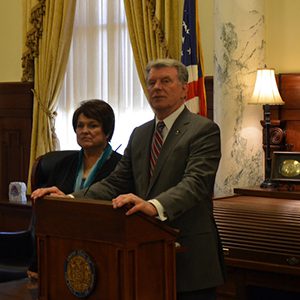 Idaho Governor C.L. “Butch” Otter signed legislation (SB 1357) into law on March 19, 2014 aimed at containing the cost of corrections, reducing recidivism, and increasing public safety. The bill passed unanimously in both the House and Senate, and received widespread support from stakeholders in the criminal justice system.
Idaho Governor C.L. “Butch” Otter signed legislation (SB 1357) into law on March 19, 2014 aimed at containing the cost of corrections, reducing recidivism, and increasing public safety. The bill passed unanimously in both the House and Senate, and received widespread support from stakeholders in the criminal justice system.
SB 1357 strengthens supervision practices and programs to reduce recidivism; restructures parole to make better use of prison space; tailors sanctions for violations of supervision; and assesses, tracks, and ensures the impact of recidivism-reduction strategies. The legislation is expected to slow Idaho’s prison population growth, reduce recidivism by about 15 percent, and avert corrections spending between $221 and $288 million over the next five years.
“We all realized that unless we made some important changes, the prison population would continue to grow significantly,” said Governor Otter. “That would mean spending much more without actually addressing the causes. I applaud everyone who worked tirelessly to produce the legislation that I was pleased to sign [in March]. For the people of Idaho, it will mean safer communities and better use of taxpayer dollars.”
The law is the result of nine months of extensive work with state policymakers and stakeholders in the criminal justice system. Although Idaho’s crime rate is among the lowest in the nation, it has the eighth highest incarceration rate, the second fastest growing prison population, and a recidivism rate that is higher than the national average.
In an effort to slow prison population growth and reduce recidivism, in June 2013, Idaho state leaders requested technical assistance from the CSG Justice Center, in partnership with The Pew Charitable Trusts and the U.S. Department of Justice’s Bureau of Justice Assistance, to use a data-driven “justice reinvestment” approach. SB 1357 is based on a policy framework presented in a January 2014 CSG Justice Center report.
With continued support from Idaho leaders, work has begun to implement and track the impact of the new policies. To monitor SB 1357’s performance, the state established a 10-member legislative committee. State policymakers also dedicated nearly $4 million in FY2015 to fund additional probation and parole officer (PPO) positions, PPO training, community-based substance use and cognitive behavioral treatment programs, and IT staff for both the Idaho Commission of Pardons and Parole and the Idaho Department of Correction.
This project was supported by Grant No. 2013-ZB-BX-K002 awarded by the Bureau of Justice Assistance. The Bureau of Justice Assistance is a component of the Department of Justice’s Office of Justice Programs, which also includes the Bureau of Justice Statistics, the National Institute of Justice, the Office of Juvenile Justice and Delinquency Prevention, the Office for Victims of Crime, and the SMART Office. Points of view or opinions in this document are those of the author and do not necessarily represent the official position or policies of the U.S. Department of Justice.
Arkansas policymakers have long expressed concerns about the state’s high recidivism rate. Over the past 10 years, an…
Read MoreIn April 2025, Arkansas Governor Sarah Huckabee Sanders signed a package of bipartisan criminal justice legislation into law,…
Read More Explainer: Key Findings and Options from Arkansas’s Justice Reinvestment Initiative
Explainer: Key Findings and Options from Arkansas’s Justice Reinvestment Initiative
Arkansas policymakers have long expressed concerns about the state’s high recidivism rate.…
Read More Explainer: How a New Law in Arkansas Tackles Crime, Recidivism, and Community Supervision Challenges
Explainer: How a New Law in Arkansas Tackles Crime, Recidivism, and Community Supervision Challenges
In April 2025, Arkansas Governor Sarah Huckabee Sanders signed a package of…
Read More









